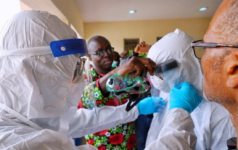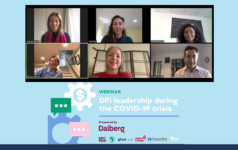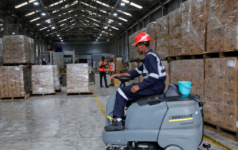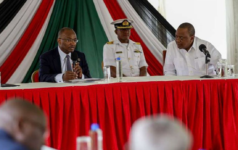Dalberg uses cookies and related technologies to improve the way the site functions. A cookie is a text file that is stored on your device. We use these text files for functionality such as to analyze our traffic or to personalize content. You can easily control how we use cookies on your device by adjusting the settings below, and you may also change those settings at any time by visiting our privacy policy page.
During a crisis, Emergency Operations Centers help save lives and minimize socioeconomic losses. Dalberg worked with the Bill and Melinda Gates Foundation during the 2013-2016 Ebola epidemic to establish EOCs. This is what we learned.
The 2013-2016 Ebola crisis claimed more than 11,000 lives in Guinea, Liberia, and Sierra Leone. More than $2.2 billion in GDP losses occurred across the three countries, which were on uncertain financial footing long before the outbreak unfolded. Socio-economic losses, ranging from the deaths of healthcare workers to travel bans that slowed the transport of goods, compounded the challenges of an infection that threatened to spread around the globe.
As the three-year Ebola challenge unfolded, the Bill & Melinda Gates Foundation saw that urgent transformation of existing crisis management systems was needed, especially in the countries where the impacts of health- or conflict-related catastrophe would be felt most deeply. In partnership with Dalberg, the foundation has spent the last seven years engaged in the strategic planning, operationalization, and support of Emergency Operations Centers (EOCs) across Africa. Support has also been provided to emergency response and humanitarian assistance systems in Asia and Latin America.
EOCs exist to provide fast and effective crisis response. They aim to help countries and communities come together in a way that saves lives and allows economies to get back on their feet more quickly after disasters have passed.
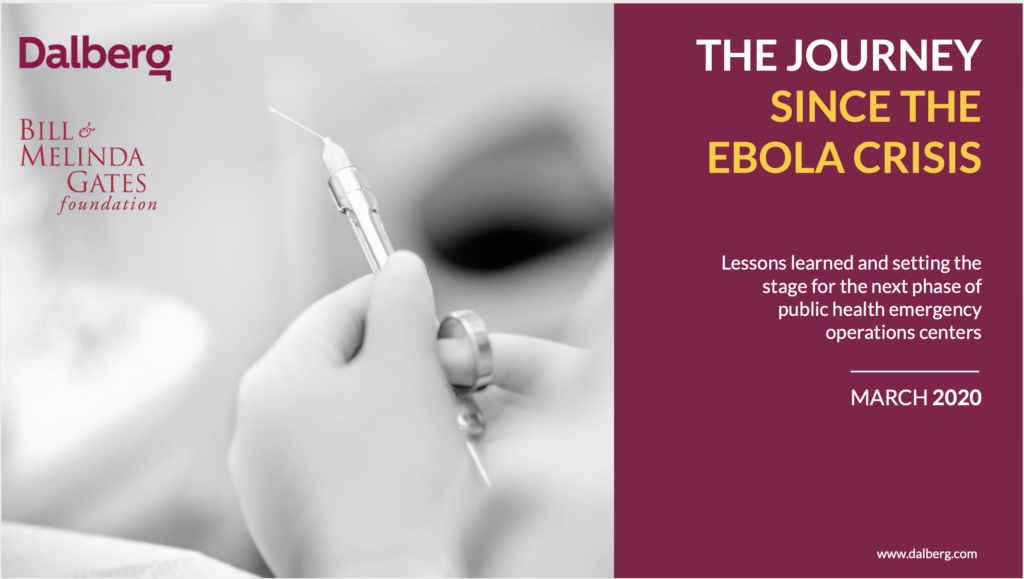
What an Emergency Operation Center does – and why more are needed today
Fast forward to 2020: the outbreak and spread of COVID-19 has halted the world economy and overwhelmed healthcare systems in countries around the globe. For resource-constrained countries and sub-national units, it is clear that the need for crisis response has never been greater. EOCs could help coordinate and implement critical care facilities, lessening the public health and economic impacts of public health emergency-related challenges in the areas that are most in need of help.
EOCs work by bringing to life and coordinating a decentralized strategy for care and a country-specific operational model for dealing with crises. Establishing an EOC requires a situational- and geographic-specific mix of funding from a diversity of sources that are determined based on context and the social and political dynamics at hand. Technical assistance and on-going support are also required to ensure smooth functioning over time.
Diplomacy and soft skills are also essential to setting up a functioning EOC. Interaction with stakeholders ranging from senior government officials to local community workers is key: every group needs to be consulted and bought into the solutions that are created. Consensus-building and education is needed across all levels, along with the ability to inspire a diversity of people to agree upon a course of action that is specifically aimed at improving public health and socioeconomic outcomes.
With more EOCs, cross-border responses would be possible, which in the past could prevent situations such as the recent DRC-Uganda cross-border contamination of Ebola. The response to the 2013 collapse of Bangladesh’s Savar building could have been better managed from a public safety and information perspective, and the 2010 Haiti Cholera outbreak may have reached a fraction of the more than 8,000 people who became sick with the disease.
These are but a few examples, and for now, we must focus on what we can do to create a better future. Starting today, we could lessen the effects of COVID-19 if more EOCs were strengthened, and if principles of an effective EOC were quickly implemented in countries without an EOC.
Not the first virus. Not the first crisis.
Response to the COVID-19 pandemic can draw learnings from past EOC efforts across the African continent. In Nigeria, the existence of an EOC was a major contributing factor to the country’s success in stopping the outbreak of the Ebola virus. An EOC was established utilizing public health systems from its 2008-2009 polio eradication campaigns and human resources from partner organizations. Through swift action, the EOC Rapid Response Teams identified, diagnosed and successfully managed thousands of suspected Ebola cases, resulting in a low but nonetheless regretful casualty rate of eight deaths, in comparison to other affected countries in the region, which had a much higher death ratio and greater spread of disease.
Senegal did not have a functional public health EOC when Ebola was at its doorstep in 2015. However, due to efforts of the local government and the international community, the outbreak was contained in the country with the successful treatment of a single patient in Dakar. Hoping to have the tools on hand to replicate this swift response for future outbreaks that threatened to spread, Senegal set up its own EOC, which is now fully operational. It was deployed to contain a Dengue fever outbreak in November 2018, among others.
In addition to these examples, support has been provided to ministries of health in Burkina Faso, Cameroon, Guinea Bissau, Mali, Mauritania, Nigeria and Zimbabwe, to set up or strengthen EOCs.
We must act now
But more action is needed, especially as the global COVID-19 pandemic arrives in some of the world’s most vulnerable countries. This is a call for the international community to stand ready to respond in ways that lessen the impact of the pandemic and prepare countries for a better economic future, both in the face of the current pandemic and for future crises that will come to pass.
Learn more in this presentation that documents our lessons learned, and don’t hesitate to get in touch if Dalberg can share further documentation and approaches for the establishment of EOCs or crisis-management protocol


